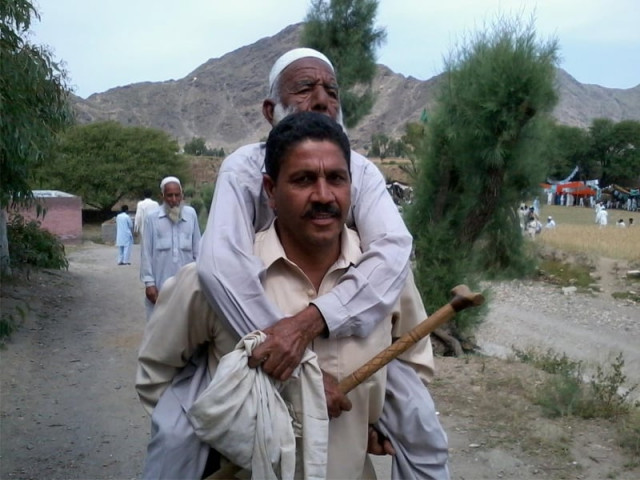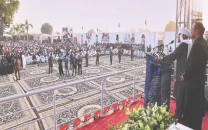2013-4: A shattered year, a fragile tomorrow
As 2014 is the year of local govt elections, economic reforms, there is glimmer of hope.

Elections were ushered in with a spate of violence, particularly against the former ruling party. At least 18 people died in a blast targeting the ANP corner meeting on April 16. However, The general elections in May 2013 saw an unprecedented number of people coming out to exercise their right to vote, many among them were first time voters. In the 2008 elections, voter turnout in K-P and Fata was 34 and 31% while this time it was 44 and 36% respectively. Bringing in a new government did not necessarily bring in much-desired peace in region. A month later, 15 worshipers were killed in a suicide-and-gun attack on June 21 in the suburbs of Peshawar. PHOTOS: EXPRESS
The mind careens to form an opinion of the year in retrospect and what will follow. 2013 has been the same; intermittent pauses of peace in violence, carrying the onus of a decade-long war and lingering on with hope that tomorrow might just be better than today.
Keeping up with its spirit of inconsistency, Khyber-Pakhtunkhwa (K-P) voted comparatively newer political parties into power after a series of bomb attacks during the interim government that targeted the former ruling party. It was hoped that the situation would “change” after the polls.

The aftermath of a suicide-and-gun attack on June 21 in the suburbs of Peshawar. PHOTO: EXPRESS
The newer rulers who came with a message of “peace talks” suffered the first setback when two of its parliamentarians were killed within the first 20 days of the government. This was followed by a series of political point scoring and bureaucratic upheaval resisting the “change”.
A series of stringent attacks, which killed more than 140 people within a week in September, sent alarm bells ringing. There was immediate criticism from the public coupled by a sense of cluelessness on part of the government. The confession later that week came from the highest echelons. “If we fail, we fail the youth, and if their trust is broken it will be difficult to mend again,” said a senior government functionary in a background briefing.
As the pendulum moves – a to-and-fro motion between cleanliness drives, biometric voting, Right to Information and the occasional blood bath – a region that tries to rise from the depth of sorrow is lulled into hope and awoken by a nightmare.
The reforms for accountability, transparency and better governance are undoubtedly commendable efforts, but peace remains essential. A region where something as basic as an immunisation drive cannot be conducted without grand measures in the form of a heavy security apparatus, the fragility of peace reveals itself.
Despite the security measures, many aid workers and policemen have been targeted this year. In district Swabi, vaccinators were even allowed to carry weapons for their own protection.

At least 18 people died in a blast targeting the ANP corner meeting on April 16. PHOTO: EXPRESS
While the government’s claims for security measures are true, the solutions put forward side-track a grave reality. Much needs to be done in the settled areas, particularly in the Southern districts of the province.
Other problems that raised their heads out of the chaos - target killings, extortion and kidnapping for ransom - and sent the previous government into a state of non-existence, have now become contagious for the whole province. Businessmen, doctors, the elite and anyone who found it possible, have managed to either move abroad or to comparatively safer cities outside Khyber-Pakhtunkhwa.
While the exodus from the tribal areas to K-P continues, the population in urban centres, particularly the provincial capital, is getting out of hand. As an affluent class moves out of Peshawar, there is increasing space for economic stagnation. It will only be partially true to term law and order as the reason behind the migration; the policies of the government are equally blame worthy.
As 2014 is the year of the local government elections and economic reforms aimed to bring back investors into the province, there is a glimmer of hope. But these reforms cannot be mere political slogans and must provide out-of-the-box solutions.
For the Federally Administered Tribal Areas (Fata) and Frontier Regions (FRs), each of the seven agencies is combined by a loosely coherent anarchy. Legally, there hasn’t been much of a change for over a century and Fata still rots in a corner since 1901 - the year the Frontier Crimes Regulation was implemented. Fata remains an informational black hole, an anomaly in this age, where human rights are an elusive dream. Probability is that there have been more seminars and speeches on Fata than anywhere in the world, but there is hardly any substantial change.
The Waziristans remain the most turbulent of the tribal belt, while Orakzai keeps silent and Kurram tied to a peace-agreement to guard it from sectarian strife. Bajaur and Mohmand Agency have been relatively peaceful, but only by their own standards. This year a massive military onslaught took place in Khyber Agency’s Tirah valley. This was the first time the military entered the region. Thousands were displaced but fewer have made it back to the area since then.
2014 remains vital for Fata and Khyber-Pakhtunkhwa, with particular reference to the changing geopolitical realities. While apprehension of what happens in Afghanistan remains the key focus of policy makers, which recently led to increased security on the western borders, it is important that Fata be streamlined with the rest of the country before it expands in terms of the conflict associated with it.
Fata-ization is not a myth any longer and what happens here is no longer a local issue or a national one, but a conflict measured in international terms.
Published in The Express Tribune, December 31st, 2013.



















COMMENTS
Comments are moderated and generally will be posted if they are on-topic and not abusive.
For more information, please see our Comments FAQ